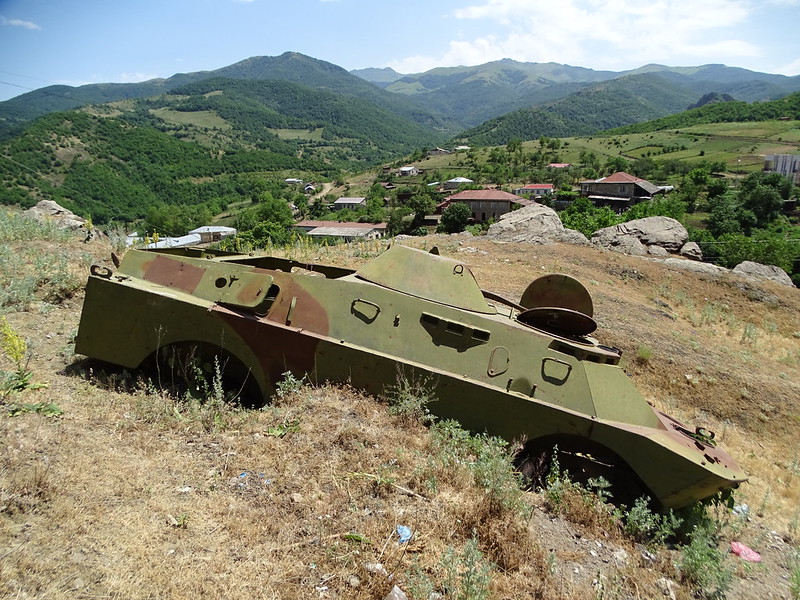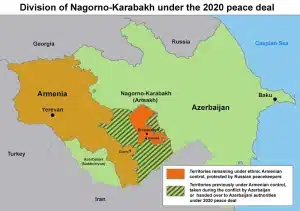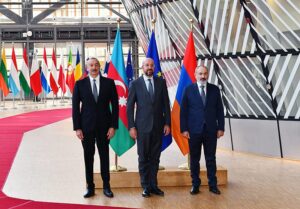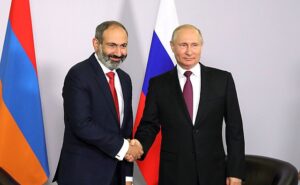Destroyed Military Vehicle – En Route from Shushi to Karintak – Nagorno-Karabakh (Source: Flickr)
The International Court of Justice, based in the Hague, has ordered Azerbaijan with immediate effect to ensure the free movement of people and goods to the disputed region of Nagorno Karabakh. It is a new episode in the deep crisis between Armenia and Azerbaijan. Protesters, who claim to be environmental activists, have been blocking the only road into the region – the Lachin Corridor – since December 12. We spoke with the founder of SD Platform Armenia, Armen Mkhchyan, about the humanitarian situation in Nagorno-Karabakh, ‘the eco-activists’, geopolitics, and the role of the West.
How is the situation at the moment? Is the blockade still fully in place?
“The only road to Nagorno-Karabakh, the Lachin corridor is still closed due to the blockade. Families have been separated and are stuck on one of the sides. The food and medicine supply is cut due to the blockade, and there are many shortages – shelves are empty every day. The Red Cross is able to transfer critical patients into Armenia, but planned surgeries are cancelled as these patients cannot go through the Lachin Corridor.
Moreover, Azerbaijan has cut gas supplies into Nagorno-Karabakh multiple times, causing residents to be without heating during the harsh winter. Schools have therefore closed several times, and children are deprived of education.”
“Families have been separated and are stuck on one of the sides. The food and medicine supply is cut due to the blockade, and there are many shortages – shelves are empty every day.”
Who are these activists and what are their demands?
“Officially, the activists demand that they protest for a monitoring mission of the mining activities of Armenia in the Nagorno-Karabakh region. They claim that Armenia’s mining activities are illegal. Armenia even accepted a monitoring mission, but only accompanied by non-partial observers. This was rejected, as the protesters demand that Azerbaijani specialists research the site.
However, it has been clear since the beginning of the blockade that these activists are sent by the Azerbaijani government. These so-called environment organisations are affiliated with the Baku government. Without the permission of Azerbaijan, these protests would never have been possible.”
What would the wider strategy of Azerbaijan then be?
“It is twofold. One the one hand, the blockade hits the income of Nagorno-Karabakh really hard, as mining activities have come to a standstill. This puts even more pressure on the livelihoods of Nagorno-Karabakh citizens. And one the other, Azerbaijan wants to put leverage on Armenia to accept all kinds of terms in the bilateral peace process, that is coordinated by Russia. For example, they want a corridor between Nakhichevan (an Azerbaijani enclave, see the map) and Azerbaijan. While Armenia accepts the presence of an Azerbaijani road, it is completely unacceptable to have a parameter around the road as this is Armenian sovereign territory.”
Map of Armenia, Azerbaijan and Nagorno-Karabakh after the 2020 war. Source: Responsible Statecraft
Some background: Nagorno-Karabakh
Both Armenia and Azerbaijan lie a claim on the region of Nagorno-Karabakh since the dissolution of the Soviet Union. Most residents in the enclave identify themselves as Armenian, and the region been governed by Armenian authorities – the Republic of Artsakh – since the 1990s. Many in the region fear ethnic conflict, as this had already occurred in the region during the First Nagorno-Karabakh War (1988-1994). Internationally, most states currently recognise Nagorno-Karabakh as Azerbaijani territory, following the borders of Soviet times.
In a bloody conflict in 2020, Azerbaijan re-conquered most of Nagorno-Karabakh. It caused thousands of deaths on both sides. Since then, both countries try to conclude a peace process led by Russia and a ceasefire is enforced by Russian peacekeepers in the region. However, this could not prevent new hostilities in September 2022, when Azerbaijani forces invaded sovereign, internationally recognised Armenian territories, killing hundreds. As Russian attention shifts to Ukraine, western powers such as the EU and US try to mediate in the conflict as well. The EU recently deployed a civilian mission in the border region between Armenia and Azerbaijan.
What is the risk of a new round of conflict?
“Azerbaijan deliberately uses “activists”, as it is unclear for the Russian peacekeepers how to deal with them. The trilateral agreement clearly states that the Lachin corridor should remain open for transport in any case. This has been clearly violated by Azerbaijan. The Azerbaijani government has shown last year that it is willing to use wide-scale violence against sovereign lands of Armenia. They want all Armenians out of Nagorno-Karabakh by using different tactics. It is not without reason that the Lemkin Institute for Genocide Prevention issued a Red Flag Alert for Genocide lately. There is real fear in Nagorno-Karabakh that Azerbaijani violence against the Armenian population will flare up again. How can we have a proper peace process and talk about co-existence if this is still the case? Azerbaijan attacks sovereign Armenian lands, killing two-hundred soldiers, wounding many. Azerbaijan asks for sovereign Armenian grounds. In that way, co-existence is far, far away.”
And how is the situation in Azerbaijan, is there any dissidence against the Aliyev government?
“The propaganda machine is running fully in Azerbaijan against Armenia. It is really scary and the hatred is spurred constantly. In my opinion, propaganda is now worse that in 2020. This puts a real strain on the possibilities to achieve peace between our countries.”
“There is real fear in Nagorno-Karabakh that Azerbaijani violence against the Armenian population will flare up again. How can we have a proper peace process and talk about co-existence if this is still the case?”
What is the role of Russia, they should guarantee the provisions of the 2020 agreement, right?
“There are various theories on why Russia fails to end the blockade. It is difficult to know actually. The appearance of “activists” could make it more difficult for the Russian peacekeepers to step in. Some also say that the Russian focus is fully on Ukraine and not on Nagorno-Karabakh. There are also theories that Russia somehow profits from this situation, trying to keep Armenia in its sphere of influence while Armenia has improved its ties with the West lately. The Armenian people are very disappointed about the situation and the inability of the Russian peacekeepers to change the situation, though. However, Azerbaijan remains responsible for all this in the first place.”
How does this situation affect the domestic Armenian government of Pashinyan?
“As said, people are disappointed. The Armenian government defers the responsibility for Nagorno-Karabakh to Russia under the trilateral agreement, kind of trying to avoid concrete actions and taking responsibility for this situation. However, on the diplomatic front they did bring the situation to the UN Security Council and International Court. The recent decision of the International Court was a small success. Anyway, for me, Pashinyan does not have such an important role in eliminating the blockade – the international community must interfere.”
What can western governments do to help end the blockade?
“The Dutch parliament accepted a resolution lately that condemned the blockade, which is very good. However it is not enough. Western governments should set concrete ultimatums to Azerbaijan to end the blockade. If these are not met, it should be tied to economic or diplomatic sanctions of some sort. Without the deeds, Azerbaijan does not care about the words.”
“Western governments should set concrete ultimatums to Azerbaijan to end the blockade.”
Azerbaijan has just become an important trade partner to the EU, as an alternative source for gas.
“Yes, we believe that this is an important reason for the EU to not step in more and present concrete economic repercussions to Azerbaijan for its actions. This is really needed. We are talking about the lives of people in Nagorno-Karabakh – it is a severe humanitarian crisis and the road should be reopened as fast as possible. The EU always talks about exporting human rights and democracy, they cannot leave this at it is because of economic reasons. This really disappoints us.”
The SD Platform is an social democratic, Armenian civic organization. They organize may activities to inspire young Armenian citizens across the counrty for social democratic values. See more at https://nl-nl.facebook.com/SD-Platform-Armenia-1298077183607658/




